|
|
|
Sort Order |
|
|
|
Items / Page
|
|
|
|
|
|
|
| Srl | Item |
| 1 |
ID:
096592
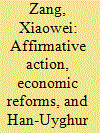

|
|
|
|
|
| Publication |
2010.
|
| Summary/Abstract |
Have workers of minority status suffered labour market discrimination in China? Do all actors in the state sector discriminate against minority workers? What are the rationales for discrimination? To address these questions, I compare two ethnic groups (Han Chinese and Uyghur) with regard to job attainment in the state sector. Data are from a 2005 survey (N = 2,947) conducted in Ürümchi, China. Data analysis shows that controlling background characteristics does not remove the Uyghur-Han difference in job attainment in state firms. However, there is no ethnic variation in employment in redistributive agencies. This contrast is explained with reference to post-1978 market transition and the resulting differentiation in the institutional tasks between state firms and government agencies.
|
|
|
|
|
|
|
|
|
|
|
|
|
|
|
|
| 2 |
ID:
114859
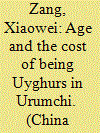

|
|
|
|
|
| Publication |
2012.
|
| Summary/Abstract |
This article asks: is the cost of being Uyghurs higher for young Uyghurs than for old Uyghurs in Ürümchi? I address this question with data from a survey of 2,947 people conducted in Ürümchi in 2005. The cost of being Uyghurs refers to the extent of economic inequality in the earnings of Han Chinese and Uyghurs. I develop three hypotheses on the effect of age on earnings differentials between Han Chinese and Uyghurs. Data analyses show that although young Uyghurs are better educated and earn more than old Uyghurs, they are more likely than old Uyghurs to suffer from being Uyghurs in Ürümchi. This finding has policy implications for the reduction of ethnic disparity in Xinjiang.
|
|
|
|
|
|
|
|
|
|
|
|
|
|
|
|
| 3 |
ID:
163662
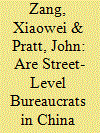

|
|
|
|
|
| Summary/Abstract |
Chengguan (城管) is part of the stability maintenance regime specializing in civil law enforcement in China. Many protests today have occurred in reaction to Chengguan harsh enforcement rather than police action. Using survey data (n = 1,721) from China, the authors found both severity and leniency in Chengguan law enforcement. The authors also found that Chengguan enforcement styles are largely conciliatory rather than legalistic, and that Chengguan officers are more likely to be harsh during politically important periods than during politically unimportant periods. The authors explain the temporal variation in Chengguan severity and leniency with three institutional factors of autocracy: resource constraints, upward accountability, and the politics of ritual events. This study offers a new account of law enforcement in China.
|
|
|
|
|
|
|
|
|
|
|
|
|
|
|
|
| 4 |
ID:
193140
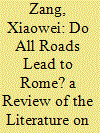

|
|
|
|
|
| Summary/Abstract |
Political elites have a tremendous influence on past, present and future socioeconomic and political developments in both western and non-western countries. Unsurprisingly, the analysis of China’s elites has been crucial in the study of politics there. A large body of literature has examined the members of the Central Committee of the Chinese Communist Party, a stronghold of the nation’s political elites. Given the growing interest and research on elite politics in the PRC in recent years, this paper reviews studies of the pathways to political power and the personal qualifications of the members of the Central Committee that are central to studies of elite Chinese politics. This review paper is organized both chronologically and thematically. It shows a shift away from the study of demographics of Central Committee members toward theorizing of how recruitment into the Central Committee works. Some scholars have theorized succession politics in China as the rise of technocracy, while others have used institutionalization and factional politics to explain how China’s leaders are selected. This paper summarizes and identifies several theoretical and methodological issues in existing studies as an effort to advance research on succession politics and political evolution in China.
|
|
|
|
|
|
|
|
|
|
|
|
|
|
|
|
| 5 |
ID:
049180
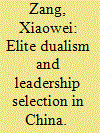

|
|
|
|
|
| Publication |
London, routledgeCurzon, 2004.
|
| Description |
xix, 244p.
|
| Series |
RoutledgeCurzon studies in China in transition
|
| Standard Number |
0415322340
|
|
|
|
|
|
|
|
|
|
|
|
Copies: C:1/I:0,R:0,Q:0
Circulation
| Accession# | Call# | Current Location | Status | Policy | Location |
| 047226 | 303.340951/ZAN 047226 | Main | On Shelf | General | |
|
|
|
|
| 6 |
ID:
135109
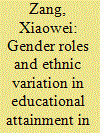

|
|
|
|
|
| Summary/Abstract |
Using survey data (n = 1,600) collected in Ürümchi in Xinjiang, China, this paper examines the Han-Uyghur gap in schooling and offers a nuanced account of educational stratification by ethnicity in urban China. Data analysis shows that Han Chinese are more likely than Uyghurs to receive schooling, and the ethnic variation persists when holding main background characteristics constant. However, the differences in schooling between Han and Uyghur men fade away when background characteristics are controlled for, whereas no similar patterns are found among women. Gender roles account for both ethnic parity in schooling between Han and Uyghur men and ethnic inequality in schooling between Han and Uyghur women, which underlies the overall Han-Uyghur gap in educational attainment in Ürümchi.
|
|
|
|
|
|
|
|
|
|
|
|
|
|
|
|
| 7 |
ID:
112440
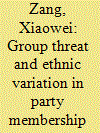

|
|
|
|
|
| Publication |
2012.
|
| Summary/Abstract |
Many scholars have examined how human capital, geography, etc. have shaped patterns of ethnic inequality in China. This paper studies the role the state plays in producing inter-group disparities in China. It discusses the link between the state and minority threat and explains how the linkage produces ethnic variation in entry into the Chinese Communist Party. Data are drawn from two surveys (N = 3,619) on Han Chinese, Hui, and Uyghurs conducted in two Chinese cities in 2001. Controlling for background characteristics removes the Han-Uyghur difference in CCP membership attainment. In contrast, no similar patterns are found when Han Chinese are compared with Hui. This contrast is explained with reference to state reaction to ethnic variation in perceived group threat.
|
|
|
|
|
|
|
|
|
|
|
|
|
|
|
|
| 8 |
ID:
139261
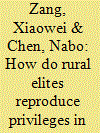

|
|
|
|
|
| Summary/Abstract |
Many scholars have shown that cadre status is associated with cadre earnings advantages in rural China. What is less clear from the published research is how political power is used by rural elites to generate personal gains. We narrow this knowledge gap by studying three main mechanisms whereby cadre privileges are reproduced in rural China. Using ethnographic data from three rural townships in Guangdong province, we show that local economies have been differentiated in the post-1978 era, leading to three different mechanisms with which village leaders in each of the three townships have maintained their earnings advantages respectively, i.e. local corporatism, informal bargaining and opportunistic parasitism. We predict that local corporatism will be the dominant model of the reproduction of cadre privileges in rural China.
|
|
|
|
|
|
|
|
|
|
|
|
|
|
|
|
| 9 |
ID:
062536
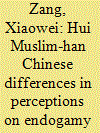

|
|
|
| 10 |
ID:
066886
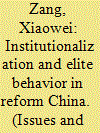

|
|
|
| 11 |
ID:
079631
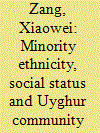

|
|
|
|
|
| Publication |
2007.
|
| Summary/Abstract |
Using a dataset (n = 4,012) from a 2001 survey in Xinjiang, I examine the effect of minority status and social status on neighbouring behaviour in urban China. Data analysis indicates that Uyghur Muslims are more neighbouring than Han Chinese. However, there is no evidence that the Uyghur approach to neighbourhood interaction can be attributed to Uyghur culture as many inter-group differences fade away once ethnic parity in social status is attained. I use my study to consider some methodological approaches used in research on ethnic behaviour in China.
|
|
|
|
|
|
|
|
|
|
|
|
|
|
|
|
| 12 |
ID:
114802
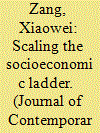

|
|
|
|
|
| Publication |
2012.
|
| Summary/Abstract |
This paper asks: do most Uyghurs perceive themselves to be middle class or lower class? What are the major determinants of their perceptions? Data are drawn from a 2007 survey (N = 900) conducted in Ürümchi in China. This paper focuses on individualized and subjective hierarchical differentiation and reports three main findings about class identity among Uyghurs. Firstly, class identity is not closely linked to occupational attainment and income among Uyghurs. However, education is a key determinant of Uyghur class identification. Secondly, psychological well-being measures are not predictors of the choice of class label by Uyghurs. Thirdly, ethnic consciousness is closely related to class identification among Uyghurs, holding main background characteristics constant. Uyghurs give more attention to their group concerns (discrimination, prejudices, intergroup inequality, etc.) than to their individual worries (such as unemployment or stress) when choosing a class label.
|
|
|
|
|
|
|
|
|
|
|
|
|
|
|
|
| 13 |
ID:
119049
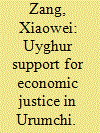

|
|
|
|
|
| Publication |
2013.
|
| Summary/Abstract |
There has been little research conducted on economic beliefs among Uyghurs in Xinjiang, although they are part of the reason Uyghurs have developed feelings of relative deprivation and unfairness. Do most Uyghurs support economic individualism, which holds that the poor are responsible for their misfortunes, economic inequality is good, and the government should not interfere in the economy? Or do they endorse economic communitarianism, which holds that the government shall provide for the poor and reduce inequality via intervention? Are there some people in the Uyghur community who are more economically communitarian than others? Are Uyghur economic beliefs related to the usual socio-demographic measures such as age, sex, education, occupational attainment and income? Is there a religious influence on Uyghur economic attitudes? If not, how can Uyghur economic preferences be accounted for? This paper addresses these questions using data from a survey conducted in Ürümchi in 2007. It shows that the vast majority of Uyghurs endorse economic communitarianism. In addition to Islamic orthodoxy, Uyghur consciousness is related to this endorsement. However, Uyghur socioeconomic status is not correlated with their economic preferences. This is partly because Uyghur-Han inequality affects Uyghur attitudes more than intra-group differentiation in social status among Uyghurs.
|
|
|
|
|
|
|
|
|
|
|
|
|
|
|
|
| 14 |
ID:
102122
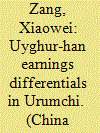

|
|
|
|
|
|
|
|